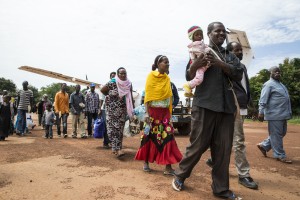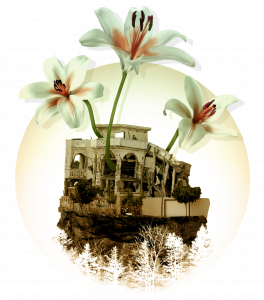
What does it mean to work with development and security related issues in a conflict zone? In a sequence of reflections from the field, our new contributor Anna Hohwü Vesperini will offer her personal account of the excitements and challenges of working with the Danish Refugee Council in South Sudan.
Long before you even set your foot in the field for the first time you go through several phases on an emotional roller coaster. It starts with excitement when reading the job ad, turns into mild optimism after the interview, and occasional doubt while waiting for an answer. By the time you receive an actual offer, panic sets in. Why would I seriously consider relocating to a conflict zone? The moment I signed the contract a full-on anxiety attack kicked in (and I discovered that wine and good friends are a good mental stabilizer).
Despite my intense nerve workout, I never really did have any doubts: of course I was going to accept the opportunity to be a trainee at the Danish Refugee Council (DRC) in South Sudan as part of their grants management and monitoring & evaluation team. As a master student in my last year, my interests have always centred on international relations and foreign policy analysis. However, as fancy as this may (or may not, I guess that depends on the reader) sound, in the end it all feels somewhat artificial. When you study international politics with the somewhat naïve hope that you one day will make a positive difference, you must first experience the issues beyond textbooks and news headlines. You must expose yourself to the world in all its horrible glory. This is the fundamental reason for why I am now writing this from Juba, the capital of South Sudan, where I hope to get a first-hand insight into a top-tier NGO, as well as experience how it is to work and live in a conflict zone.
South Sudan is the world’s youngest nation. It was officially separated from Sudan in 2011 following a national referendum. Both countries were governed under British colonial rule until 1956, but have been plagued by civil war more or less constantly in the 60 years since independence, making the Sudanese civil war(s) the longest running on the African continent.
Although the hopes and anticipations for South Sudan were great in 2011, the country descended into civil war already in December 2013, when a political power struggle broke out between President Salva Kiir and his deputy Riek Machar. The conflict quickly spread across the country, sparking ethnic tensions and violence. Numbers remain contested, but according to the UN Mission to South Sudan (UNMISS) as many as two million people have been displaced or have fled to neighbouring countries, and a further 10 000 have been killed since the conflict began. As a recently released report from the African Union testifies, atrocities and gross human rights violations have been committed by all sides in the conflict. While a fragile peace deal was signed under intense international pressure in August 2015, prospects for peace look grim – the president’s call to increase the number of states in South Sudan is regarded as a violation of the peace agreement by Riek Machar.
So how do you prepare yourself for living in such an environment, especially when you, like me, have no previous experiences to compare with? You have read about civil wars, seen images of camps for refugees and internally displaced people on TV, you might even have donated some money to the Red Cross once. But everything of that sort still remains a very abstract concept.
Well, to be honest it is actually not as terrible as one could have thought. I am posted in Juba, the capital, which as always is different from the rest of the country. Here there are a couple of decent supermarkets for the vast numbers of relatively well-off expats, there are a couple of security-approved restaurants where you can get a club sandwich, and they even have their own local beer, named after the White Nile that runs through the city.
In everyday life it is mostly basic security and crime that is a concern, which is not all that different from life in many other places. Like South Africa where I resided before you live in secured compounds with barbed wired fences, you lock your car doors whenever you drive around, and generally stay inside when the sun has set.
There are, however, a few additional add-ons. Both the residential area and the office space is located within the same compound, and you are not allowed out on foot except for quick errands just around the corner. If you are going anywhere there are drivers, as we are not allowed to drive ourselves. They will take you on a round trip to your destination in the appropriate 4×4 Toyota Land Cruiser that can handle the lack of tarmacked roads in Juba, a severe challenge for a country where rainstorms are frequent half the year, easily washing roads away in half an hour. We have guards patrolling the grounds 24/7, an obligation to always inform security of our location if outside the compound, and we receive daily security briefings. However, apart from these daily inconveniences not much reminds you that a protracted civil war is taking place, occasionally just 10-20 kilometres outside the city borders.
But you are reminded of this every day in your work. The Danish Refugee Council has one of largest NGO operations in South Sudan, working with humanitarian relief and demining. National and international staff combined numbers around 500, and we run projects in seven sites, working both with refugees from Sudan, mostly a result of previous conflicts, and internally displaced people inside South Sudan.
Everyday when you walk to the office, and everyday when you leave the office, you are reminded that some people depend entirely on the services we provide. I have never worked longer hours, but I have equally never been as motivated either. The emotional roller coaster has only started.
Anna Hohwü Vesperini
Anna Hohwü Vesperini is a trainee at the Danish Refugee Council in South Sudan, where she is working with grants management as well as program monitoring & evaluation. She is finishing her master’s degree in International Business and Politics from Copenhagen Business School, and is currently writing her thesis on South Africa’s foreign policy strategy.

Lämna ett svar